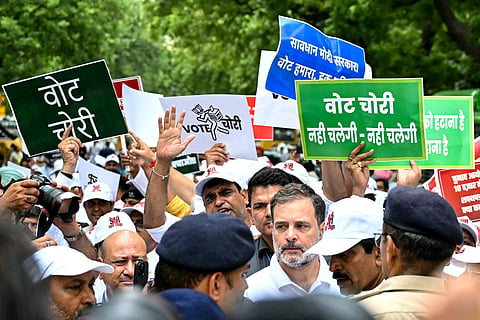Bihar proves the opposition’s biggest problem is the Congress
Seat fights, denial of ground realities and confused leadership are weakening INDIA bloc

In the run up to the Bihar elections, I was asked by a media channel about how important this poll was for Modi and the BJP. I replied that this election was far more important for the opposition, which had seen a string of losses and setbacks after last year’s Lok Sabha polls and desperately needed to change the narrative. The setbacks in Haryana, Maharashtra and Delhi hurt the Congress the most and the only pan-India opposition party had to rake up a win now. It won 6 of the 61 seats it contested.
The National Democratic Alliance’s (NDA) landslide win and the opposition’s loss in Bihar will have major implications for elections in key states in a few months, including Tamil Nadu and Bengal. And in particular, it will impact the already fragile opposition INDIA alliance that has been plagued by contradictions and infighting from day one.
Seat sharing alliance
Look at Bihar. It is baffling that the Congress and Rashtriya Janata Dal (RJD) were unable to hammer out a proper seat sharing agreement, which ultimately led to “friendly fights” on several seats. This only created confusion on the ground especially where they had overlapping support bases. Smaller parties in the alliance like the Jharkhand Mukti Morcha (JMM) ended up being sidelined and a furious JMM eventually withdrew from the state alliance altogether.
The problem here is largely with the Congress party’s approach. Their leaders are unable to reconcile to new political realities that often place them as junior partners or allies in several states. And because they don’t see the reality for what it is, the party ends up haggling for seats it should not contest, putting pressure on allies. It is even more baffling that the Congress took time to agree to projecting Tejashwi Yadav as their Chief Ministerial face. Who else would it have been? The Congress also played hardball because they were convinced that Rahul Gandhi’s vote chori yatra, which drew good crowds ahead of the elections, had made such an amazing impact that they deserved more. The end result is there for all to see.
Impact on upcoming polls
All of this will have an impact in the upcoming polls. In Tamil Nadu, the DMK is the key party in alliance with the Congress. Already, there have been murmurs of trouble here with the state Congress unit unhappy with the DMK. Some weeks ago, the Tamil Nadu Congress Legislative Party leader S. Rajeshkumar said the Congress should demand more seats in the 2026 elections, upsetting the DMK camp. There was also a spat over Congress defections into the DMK which played out on social media. Again, the Congress is on a weaker footing in the state and while they may be putting pressure to bargain for more seats, it is hardly pragmatic politics.
For the BJP, the big prize that it is eyeing in 2026 is West Bengal. The Prime Minister made that very clear at the victory speech in Delhi on the day of the Bihar results when he declared that freeing West Bengal from “jungle raj” would be the next goal. Mamata Banerjee has had a very strained relationship with the Congress and at the moment may not be keen to accommodate them at all. There is an even bigger election coming in 2027 - Uttar Pradesh. The Samajwadi party’s Akhilesh Yadav, too, will be weary of ceding more seats than necessary to the Congress party.
The road ahead
But most importantly, the Congress needs to figure out where it’s going wrong, what overhaul it needs. Blaming voter rolls and the Election Commission is simply a cover. Yes, the Election Commission has some tough questions to answer. Yes, it is biased and has behaved like an extension of the ruling party. But the Congress also needs to ask whether its leader Rahul Gandhi chooses the right issues. Reporter after reporter on the ground in Bihar (and I am not talking about good media here) said that “vote chori” had no resonance among voters. Rahul Gandhi has been fixated on only targeting Modi with little to offer as an alternative. It does not work. Chowkidar chor hai didn’t work and neither did vote chori.
In the long run, it is only a revived Congress that can fight the BJP at the national level. For that, it needs to introspect seriously which it is showing no signs of doing. In the short to medium term, it needs to be pragmatic about alliances and who calls the shots. And in most cases, it is not them any longer.



